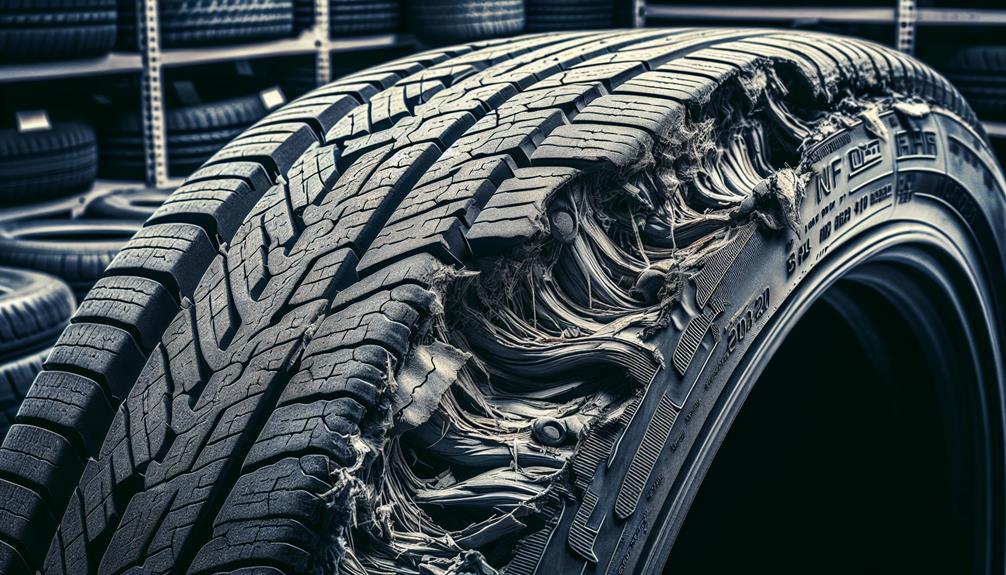Are you tired of your new car tires wearing out faster than expected?
Why Do New Car Tires Wear Out So Fast
Well, buckle up and get ready to explore the factors that contribute to this frustrating phenomenon. From the treacherous terrain you traverse to the quality of the tires themselves, there are various reasons why your fresh rubber may be losing its grip sooner than you'd like.
Why Do New Car Tires Wear Out So Fast
But fear not, dear reader, as we delve into the depths of this perplexing issue, we will uncover the secrets behind the rapid wear and tear, and perhaps even reveal some solutions to extend the lifespan of your precious wheels.
Why Do New Car Tires Wear Out So Fast
So, put on your thinking cap and prepare to unravel the mysteries of why new car tires wear out so fast.
Why Do New Car Tires Wear Out So Fast
Key Takeaways
Why Do New Car Tires Wear Out So Fast
- Extreme heat and cold weather can contribute to premature tire wear.
- Choosing high-quality tires designed for specific conditions can increase tire lifespan.
- Proper tire inflation, rotation, and alignment are essential for even wear and optimal performance.
- Driving habits, such as aggressive driving and neglecting regular tire maintenance, can accelerate tire wear.
Road Conditions and Tire Wear
Why Do New Car Tires Wear Out So Fast
Road conditions significantly contribute to the rapid wear of new car tires. Weather conditions play a crucial role in determining the lifespan of your tires. Extreme heat can cause the rubber to degrade faster, leading to premature wear. Similarly, cold weather can harden the rubber, reducing its flexibility and traction. It's important to consider the climate in your area and choose tires that are specifically designed to withstand the prevalent weather conditions.
Why Do New Car Tires Wear Out So Fast
Another factor that affects tire wear is the vehicle weight. Heavier vehicles exert more pressure on the tires, causing them to wear out faster. If you frequently carry heavy loads or have a larger vehicle, it's recommended to opt for tires with a higher load rating to ensure durability and longevity.
Furthermore, road conditions such as potholes, rough surfaces, and debris can also contribute to tire wear. Potholes can cause impact damage, leading to sidewall bulges or punctures. Rough surfaces and debris can cause abrasion and cuts on the tire tread, reducing its effectiveness and lifespan.
To minimize the impact of road conditions on tire wear, it's essential to drive cautiously and avoid rough roads whenever possible. Regularly inspecting your tires for any signs of damage and maintaining proper tire pressure and alignment can also help prolong their lifespan.
Tire Quality and Manufacturing
The quality of tires and their manufacturing process directly impacts their durability and performance on the road. When it comes to tire selection, it's crucial to consider the performance characteristics that align with your driving needs. Different tires are designed to excel in specific conditions, such as all-season tires for versatile performance or winter tires for enhanced traction on icy roads. By choosing the right tires for your vehicle, you can ensure optimal performance and longevity.
Manufacturing plays a significant role in tire quality. The process involves carefully selecting and combining materials, such as rubber compounds and steel belts, to create tires that can withstand the demands of the road. The quality of these materials and the precision in manufacturing impact the tire's ability to resist wear, maintain traction, and provide a comfortable ride.
Tire lifespan and warranty coverage are also influenced by tire quality and manufacturing. High-quality tires tend to have longer lifespans due to their superior construction and materials. Additionally, reputable tire manufacturers often provide warranty coverage that reflects their confidence in the durability and performance of their products.
Improper Tire Inflation and Alignment
Improper tire inflation and alignment can significantly impact the wear and performance of your new car tires. Maintaining the correct tire pressure is crucial for ensuring optimal tire life and performance. Incorrect tire pressure can lead to uneven tire wear, decreased fuel efficiency, and compromised handling. It's essential to regularly check your tire pressure using a reliable tire pressure gauge. The recommended tire pressure can usually be found on a sticker inside the driver's door jamb or in the vehicle's owner's manual.
Additionally, proper tire rotation is essential for maximizing the lifespan of your tires. Tire rotation involves moving the tires from one position to another to ensure even wear. This helps to distribute the load more evenly across all four tires, reducing the risk of uneven wear patterns and increasing overall tire life. Most manufacturers recommend rotating tires every 5,000 to 8,000 miles, or as specified in the vehicle's owner's manual.
Driving Habits and Aggressive Driving
To ensure the longevity of your new car tires, it's important to consider your driving habits and avoid aggressive driving techniques. Your driving style can have a significant impact on the wear and tear of your tires. By following a few simple guidelines, you can protect your investment and keep your tires in optimal condition for longer.
Here are three driving habits to avoid:
- Tailgating: Maintaining a safe distance between your vehicle and the one in front of you is crucial. Tailgating not only increases the risk of accidents but also puts unnecessary strain on your tires. The constant braking and accelerating required to maintain a close distance can wear out your tires more quickly.
- Hard Braking: Slamming on the brakes can cause excessive heat buildup in the tires, leading to accelerated wear. It's important to practice smooth and gradual braking whenever possible to minimize stress on your tires.
- Aggressive Acceleration: Rapid acceleration puts a tremendous amount of strain on your tires. The sudden force exerted on the tires can wear them down faster and reduce their overall lifespan. Gradually increasing your speed will help preserve your tires and provide a smoother driving experience.
Lack of Regular Tire Maintenance
Considering the impact of driving habits on tire wear, it's crucial to address the issue of lack of regular tire maintenance. Neglecting proper tire maintenance can significantly decrease the lifespan of your new car tires. It's important to understand the key maintenance practices that can help extend the life of your tires.
One essential maintenance practice is tire rotation and balancing. This involves moving each tire to a different position on the vehicle to ensure even wear. By rotating and balancing your tires regularly, you can prevent uneven wear and extend their lifespan. It's generally recommended to rotate your tires every 5,000 to 7,000 miles or as advised by your vehicle manufacturer.
Another important aspect of tire maintenance is monitoring the tire tread depth and wear indicators. The tire tread depth determines the tire's grip on the road and its ability to channel water away to prevent hydroplaning. As the tread wears down, the tire's performance and safety are compromised. It's essential to regularly check the tread depth using a tread depth gauge or the built-in tread wear indicators, which are small rubber bars located in the tire grooves. If the tread depth reaches the wear indicators or is below the recommended depth, it's time to replace the tires.
Conclusion
In conclusion, the rapid deterioration of new car tires can be attributed to various factors including:
- Road conditions
- Tire quality
- Improper inflation and alignment
- Driving habits
- Lack of regular maintenance
These elements collectively contribute to the wear and tear of tires, leading to reduced performance and shorter lifespan.
To ensure optimal tire longevity, it's crucial to prioritize:
- Cautious driving
- Regular maintenance
- Proper inflation and alignment
By adhering to these practices, you can extend the life of your tires and enhance your driving experience.

